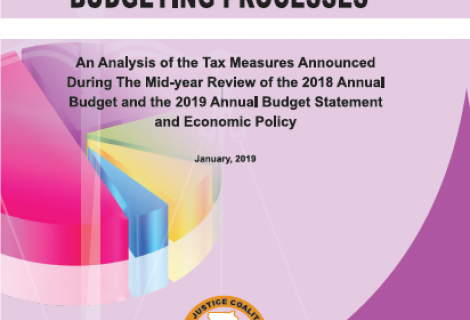
Promoting progressive taxation in the budgeting processes: an analysis of tax measures announced during the mid-year review of the 2018 Annual Budget and the 2019 Annual Budget Statement and Economic Policy
Introduction
Tax Justice Coalition – Ghana (TJC – Ghana) conducted an analysis of the tax policy initiatives and measures announced in the Mid-Year Review of the 2018 Annual Budget Statement and Economic Policy and the 2019 Annual Budget Statement and Economic Policy as approved by Ghana’s Parliament. Based on the Analysis, the TJC – Ghana wishes to share with the government, Ghanaians and other stakeholders its views on some of the policy initiatives.
In July 2018, the Minister for Finance, presented to Ghana’s Parliament, a mid-year review of the government’s 2018 Annual Budget, which included some tax policy initiatives. Some of these policies were repeated in the 2019 Annual Budget Statement and Economic Policy. Those of immediate concern to TJC – Ghana are:
- The conversion of the GET Fund VAT rate of 2.5% to a straight levy;
- The conversion of National Health Insurance Levy of 2.5% to a straight levy;
- The introduction of a new income tax band with a threshold of GHS 10,000 at a rate of 35% which was increased to GHS 20,000 with a lower rate of 30%;
- The imposition of a luxury tax on vehicles with engine capacity of 3000 cubic centimetres and above;
- The intensification of tax compliance measures.
As a key Civil Society Organization (CSO) and stakeholder, the TJC-Ghana finds it necessary to indicate its position on some of these policy initiatives and their impact on the people and the economy. This is why the TJC – Ghana conducted the analysis to enable it raise concerns, demand that government revisits some of the policy initiatives and endorse those that it finds appropriate.